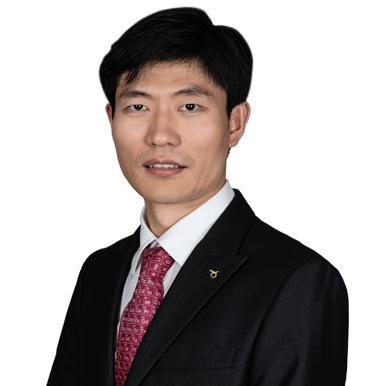
Ben Wang
Introduction:
Ben Wang is a full professor at the Institute of Translational Medicine, and Key Laboratory of Cancer Prevention and Intervention of the Ministry of Education of China, The Second Affiliated Hospital, School of Medicine, Zhejiang University.
Professional Appointments
01/2013-now Full Professor, Institute for Translational Medicine, Zhejiang University
06/2013-12/2022 Associate Professor, Institute for Translational Medicine, Zhejiang University
07/2011-06/2013 Post-doctoral Research Follow, Zhejiang University
01/2010-01/2011 Research Scholar in Wyss Institute for Biologically Inspired Engineering, Harvard University
01/2009-01/2010 Research Scholar in the Division of Health Sciences and Technology (HST), Harvard-MIT
12/2006-12/2008 Research Assistant in Center for Biomaterials and Biopathways, Zhejiang University
09/2006-07/2007 Teaching Assistant in the Department of Chemistry, Zhejiang University
Education
09/2006-06/2011 Ph.D. in Chemistry & Biomedical Engineering, Zhejiang University & Harvard University (Joint PhD Program)
09/2004-06/2006 M.S. Student in Biology, Zhejiang University, China (Graduated with Honor)
09/2000-06/2004 B.S. in Chemical Engineering, Qufu Normal University, China (Graduated with Honor)
Area of Research: Chemical Biology, Bioinorganic Chemistry, Medical Technology, Translational Medicine
Focus: to study the interfaces of cell-cell, and cell-materials, and develop the tools for cancer diagnostics and personalized therapeutics.
Technique Used: biochemical and molecular biological technique, cell culture, chemical synthesis and characterization, electron microscopy, microfluidics, mouse (or primate) models.
The Wang laboratory uses an interdisciplinary approach that integrates material science, biology, chemistry, and engineering to solve problems in human health. It is emphasized that using Nature's design principles to develop bio-inspired materials and devices, and ultimately, transform medicine. From the physicochemical perspective, they are focused on understanding the molecular mechanisms involved in the interfaces of cell-cell, and cell-materials, and developing the tools for cancer diagnosis and personalized medicine.
1. Cell surface engineering
Cellular interfacial engineering here as an avenue of research covers two points, Firstly, it is with the purpose of exploring the molecular structure of cells from a biological perspective and secondly, it aims at discovering the properties of materials from the scope of material science, such as surface topography and structure of extracellular matrix (ECM), cell size and shape, and so on.
2. Diagnostic macro/micro-devices based on the cellular interface
Cell rolling and migration is an important physiological (such as tissue repair) and pathological process (such as cancer metastasis) that is used to recruit specific cells in the bloodstream to a target tissue. Learn from a similar process, we aim to develop microfluidics/paper-based technologies to sort cells (for more broad vision, exosome or bio-macromolecules such as DNA/RNA/proteins included) for cancer diagnostic and therapeutic applications.
3. Therapeutic micro/nano-tools based on the cellular interface
Long systemic circulation lifetime is vital for drug delivery because long-circulating vehicles can more effectively localize in the disease sites, such as tumors and cardiovascular lesions. Erythrocytes, or red blood cells, are Nature's long-circulating delivery vehicles. We are interested in exploring and demonstrating the mechanism responsible for its roles. It will inspire the design and engineering of man-made delivery systems for cancer treatment in the future.
Funding Information
2021 – 2023 Key Project from NSF of Zhejiang Province Z21H160013 (Principal Investigator)
2019–2021 Open Research Project of Military Logistics (Investigator)
2017 – 2018 Innovation and Cultivation Project of the Science and Technology Commission of the Military Commission on Biological and Cross-Cutting Science and Technology (Principal Investigator)
2016 – 2020 National Key R&D Program “Research and Development of Biological and Medical Materials for Tissue and Organ Replacement” 2016YFC1100800 (Investigator)
2016 – 2019 Distinguished Young Scientist Award from NSF of Zhejiang Province LR16H180001 (Principal Investigator)
2016 – 2019 NSFC Grant 81570168 (Principal Investigator)
2015 – 2017 NSFC Young Investigator Grant 81401541 (Principal Investigator)
2015 – 2017 Major Project of Science and Technology Department of Zhejiang Province 2014C03048-2 (Co-PI)
Honors and Awards
2020 Outstanding Faculty Member (Institute of Translational Medicine, ZJU)
2019 Young Excellent Abstract Awards (The XVII International Symposium on Blood Substitutes and Oxygen Therapeutics, Japan)
2019 Outstanding Faculty Member (Zhejiang University School of Medicine)
2018 Outstanding Faculty Member (Institute of Translational Medicine, ZJU)
2017 Excellent Postdoctoral Fellow (Department of Human Resources and Social Security of Zhejiang Province)
2017 Outstanding Faculty Member (Institute of Translational Medicine, ZJU)
2017 Excellent Moral Tutor for Postgraduate (Zhejiang University School of Medicine)
2016 Excellent Class Adviser (CKC Honor College, Zhejiang University)
2016 Outstanding Faculty Member (Institute of Translational Medicine, ZJU)
2015 Distinguished Young Scientist Award (NSF of Zhejiang Province)
2014 Significant Contribution Prize in Publication (Zhejiang University School of Medicine)
2014 Outstanding Faculty Member (Institute of Translational Medicine, ZJU)
2013 Distinguished Young Scholar (Zhejiang University)
2009 Leadership Scholarship (Committee of 100)
